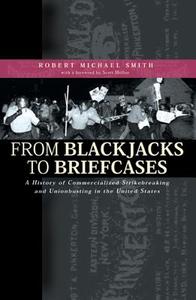
From Blackjacks To Briefcases
History Of Commercialized Strikebreaking
- Editore:
Ohio University Press
- EAN:
9780821414668
- ISBN:
0821414666
- Pagine:
- 192
- Formato:
- Paperback
- Lingua:
- Inglese
Descrizione From Blackjacks To Briefcases
Athens, Ohio--Robert Smith uncovered the sordid practices and the extent of a uniquely American industry by reading the subpoenaed documents of strikebound companies and their mercenary strikebreakers, by digging through newspaper archives for articles on long-forgotten strikes, and by studying the testimony of executives and strikebreakers who appeared before private, state, and federal governmental inquiries. Smith describes incidents, often bloody, involving strikebreakers in industrial, transportation, and mining disputes across the nation--including infamous or revealing strikes in California, Colorado, Ohio, Illinois, Michigan, Missouri, New Jersey, New York, Pennsylvania, Rhode Island, Virginia, and West Virginia. While the activities of such hired guns are occasionally touched upon in broader studies, or in accounts of specific strikes, the lack of primary evidence has made a thorough examination of this industry difficult. Many of the earliest anti-union entrepreneurs carried their offices in their hats, and their secretive nature and the business community's efforts to disassociate itself from these often-unsavory characters left little for historians to record. As the United States became an industrial power after the Civil War, much of the business community steadfastly resisted labor's efforts to bargain collectively. The judicial system, police and other militia forces, as well as government authorities, historically have helped anti-union employers cow workers and maintain their dominance. The role played by anti-union entrepreneurs, however, was obscured until the 1950s. Workers first challenged this heirarchy in the Great Railroad Strike of 1877--an uprising thatspurred creation of the National Guard--and industrial violence did not significantly abate until the federal government sanctioned collective bargaining with the passage of the Wagner Act in 1935. In response, unionbusters became increasingly more sophisticated and more subtle. Pinkerton hired-guns gave way to professional strikebreakers who many regarded as defenders of American economic liberty. Wary of antagonizing the public, these armies of hired muscle were superseded in turn by undercover men--who were eventually replaced by experts in the nuances of national labor law. Emboldened by President Reagan's busting in 1981 of the air traffic controllers and the pro-business milieu of the post-Reagan years, professional union-busting came full circle. Smith says the newest breed of anti-union entrepreneurs rely upon thugs who differ little from the brutal men who filled the armies marshaled by the Pinkertons, the notorious Baldwin Felts Agency, or even the "King of the Strikebreakers," Pearl Bergoff, nearly a century ago. Since the mid-1980s, hundreds of firms--including the Detroit News, Caterpillar and Pittston Coal--when facing angry workers have contracted with agencies that promise to solve their labor troubles. While some supply their clients with replacement workers, others (like the Asset Protection Team or Special Response Corporation, which promise to provide frightened employers "A Private Army When you Need it Most") specialize in security services. Reproductions of such advertisements, and photographs, some shocking, of strikebreakers and their tactics are an important dimension of Smith's book. "In no other country has the struggle between management and its employeesengendered a contingent of mercenaries who specialized in breaking strikes," observes Smith. Surprisingly, students of the American labor story have paid little attention to strikebreaking and unionbusting agencies. FROM BLACKJACKS TO BRIEFCASES breaks important new ground in fully documenting companies' long reliance upon anti-labor specialists--an important factor in the puzzle of the failure of the American labor movement. This revealing study challenges journalists, scholars, and labor historians to look further into how the business community in the United States has relied upon mercenaries for a century and a half.


